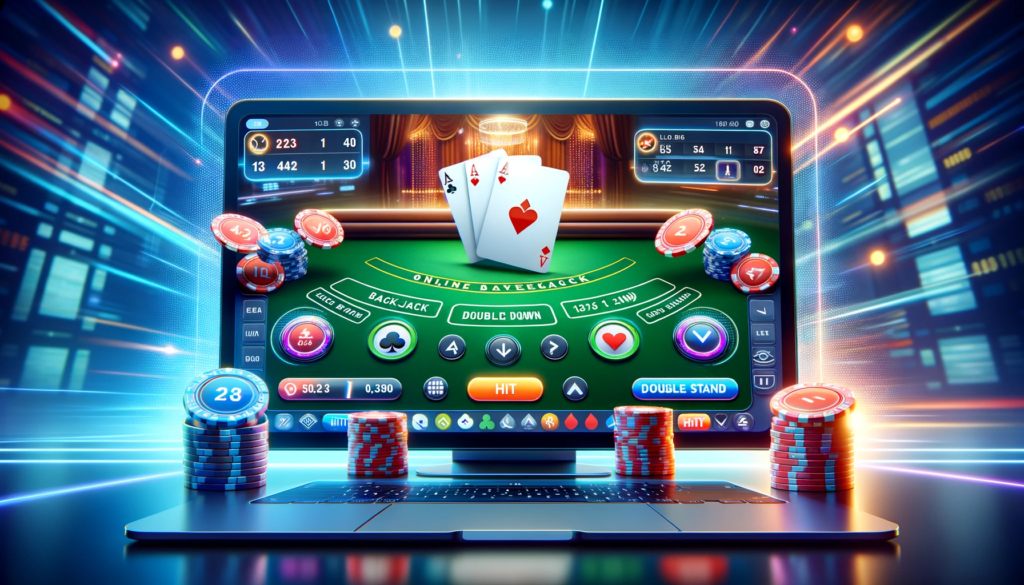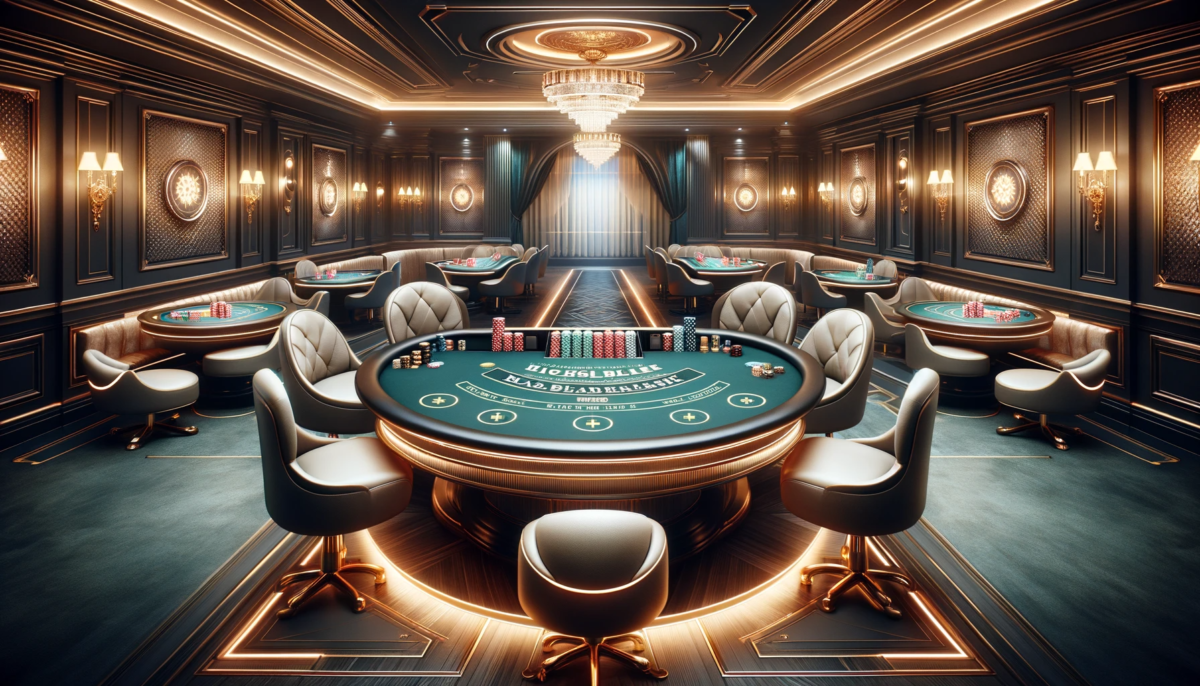Beginner’s Guide to Blackjack
Blackjack, often referred to as 21, is a classic card game that combines elements of chance and strategy. It’s a staple in both traditional and online casinos and is beloved for its blend of simplicity and depth. Here’s a comprehensive black jack guide designed to provide beginners with a thorough understanding of the beloved casino game.
Objective of the Game
- The primary goal in blackjack is to beat the dealer’s hand. This can be achieved in one of three ways:
- Getting a ‘Blackjack’ with your first two cards (an Ace and a 10-valued card), without the dealer also getting a Blackjack.
- Having a final score higher than the dealer without exceeding 21.
- Letting the dealer draw additional cards until their hand exceeds 21 (‘busts’).
Card Values
- Numbered cards (2-10) hold their face value. For instance, a 7 of any suit is worth 7 points.
- Face cards (Jack, Queen, King) are each worth 10 points.
- Aces are unique as they can be either 1 or 11, depending on which is more beneficial for your hand.
The Gameplay
- The Deal:
- Each player, including the dealer, is dealt two cards. In most blackjack games, players’ cards are dealt face up. One of the dealer’s cards is visible (face up), and the other is hidden (face down).
- Example: You receive a 6 of Hearts and a 9 of Spades. The dealer’s visible card is a King of Diamonds.
- Player’s Turn:
- If your first two cards don’t total 21 (a Blackjack), you have several options:
- Hit: Request another card to try to get closer to 21.
- Stand: Keep your current hand and end your turn.
- Double Down: Double your initial bet and receive exactly one more card.
- Split: If you have two cards of the same value, you can split them into two separate hands, each with its own bet.
- It’s crucial not to exceed a total of 21, or you’ll ‘bust’ and lose regardless of the dealer’s hand.
- Example: With your 6 and 9, totaling 15, you might choose to hit, hoping for a 6 or less.
- If your first two cards don’t total 21 (a Blackjack), you have several options:
- Dealer’s Play:
- After all players have completed their turns, the dealer reveals their hidden card.
- Dealers must follow strict rules: typically, they must hit until their cards total 17 or higher.
- Example: The dealer reveals a 6 of Clubs, giving them a total of 16. They must hit and receive a 9 of Hearts, totaling 25. The dealer busts.
- Determining the Winner:
- If you haven’t busted, your hand is compared to the dealer’s. The higher hand wins.
- If both you and the dealer have the same total, it’s a ‘push’, and your bet is returned.
- Payouts:
- A winning hand typically pays 1:1.
- A Blackjack often pays 3:2.
- If the dealer gets Blackjack, all player hands lose, except for a player’s Blackjack, which would result in a push.
Basic Strategy
- When to Hit or Stand:
- Hit if your hand totals 11 or less (no risk of busting).
- Stand if your hand is 17 or more.
- The decisions for totals between 12 and 16 depend on the dealer’s face-up card.
- Doubling Down:
- This is advantageous when you have a total of 10 or 11, especially if the dealer shows a lower card.
- Splitting Pairs:
- Always split Aces and 8s.
- Never split 10s and 5s.
- Decisions on other pairs depend on the dealer’s card.
Etiquette and Tips
- Understand and respect the rules and procedures of the blackjack table you’re at.
- Use hand signals to indicate your decisions: tap the table for ‘hit’, wave your hand horizontally over the cards for ‘stand’, etc.
- Be courteous to the dealer and other players.
- Manage your bankroll wisely. Set a budget for your gaming session and stick to it.

Conclusion
Blackjack is a game of both chance and skill. While you can’t control the cards you’re dealt, making smart decisions based on the basic strategy can significantly improve your chances of winning. Remember, the essence of blackjack is not just about getting as close to 21 as possible, but also about beating the dealer’s hand while avoiding going bust. As you gain experience, you’ll start to appreciate the subtleties and depth of strategy that make blackjack so engaging. Remember to gamble responsibly and enjoy the game for the fun and entertainment it provides.
Blackjack FAQ
Here’s a list of 15 frequently asked questions about Blackjack, provided in a clear Q&A format to help both new and experienced players understand the game better.
- What is Blackjack?
- Blackjack is a card game played in casinos, where the objective is to beat the dealer by having a hand value closer to 21 without going over.
- How is Blackjack played?
- Players are dealt two cards and can choose to ‘hit’ (take another card) or ‘stand’ (keep their current hand), aiming to get as close to 21 as possible without exceeding it.
- What are the card values in Blackjack?
- Cards 2-10 are worth their face value, face cards (Jack, Queen, King) are worth 10, and Aces can be worth 1 or 11.
- What does ‘Blackjack’ mean?
- A ‘Blackjack’ is when the first two cards dealt are an Ace and a 10-value card, totaling 21. It typically pays out more than other wins.
- What happens if my hand exceeds 21?
- If your hand value exceeds 21, you ‘bust’ and automatically lose the round, regardless of the dealer’s hand.
- Can I play Blackjack online?
- Yes, Blackjack is widely available at online casinos, with various versions offering different rules and betting options.
- What is a ‘push’ in Blackjack?
- A ‘push’ occurs when both the player and dealer have the same hand value, resulting in a tie. The player’s bet is returned.
- What does it mean to ‘double down’?
- ‘Doubling down’ involves doubling your initial bet after receiving your first two cards, in exchange for committing to stand after receiving one more card.
- What is ‘splitting’ in Blackjack?
- If you are dealt two cards of the same value, you can split them into two separate hands, each with its own bet.
- What is the ‘house edge’ in Blackjack?
- The ‘house edge’ is the statistical advantage the casino has over the players. In Blackjack, it varies based on the rules and how well players use basic strategy.
- Is card counting allowed in Blackjack?
- Card counting is a strategy to track the ratio of high to low cards remaining in the deck. It’s not illegal but is frowned upon in casinos, and players may be asked to leave if suspected of counting.
- What are some basic Blackjack strategies?
- Basic strategies include knowing when to hit, stand, double down, or split based on your hand and the dealer’s visible card.
- What does ‘insurance’ mean in Blackjack?
- Insurance is a side bet offered when the dealer’s upcard is an Ace, allowing players to bet on whether the dealer has a Blackjack.
- Can the dealer make decisions in Blackjack?
- No, the dealer must follow predetermined rules, usually hitting until they reach a soft 17.
- How can I improve my Blackjack skills?
- Practice the game, learn basic strategy, understand the odds, and manage your bankroll effectively. Online simulators and guides can also be helpful tools.
These FAQs cover the basic rules and strategies of Blackjack, offering a solid foundation for anyone looking to learn the game or improve their skills. Remember, while strategy can increase your chances of winning, Blackjack is still a game of chance, and responsible gambling should always be a priority.
